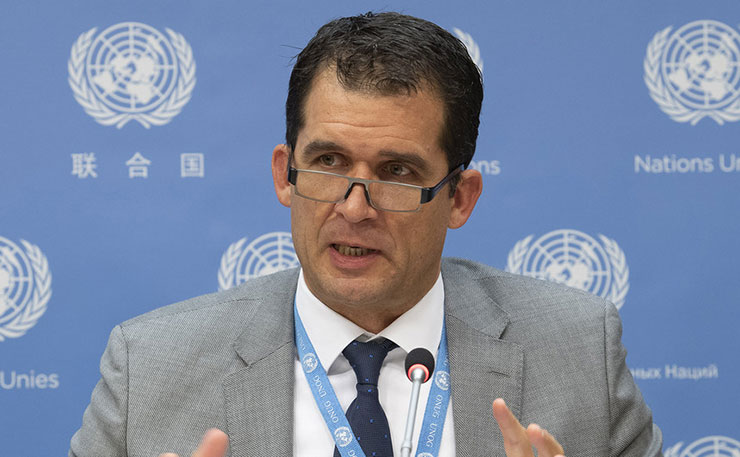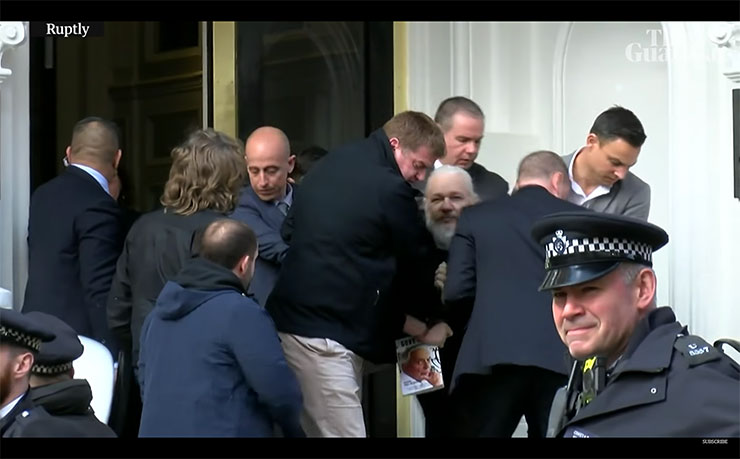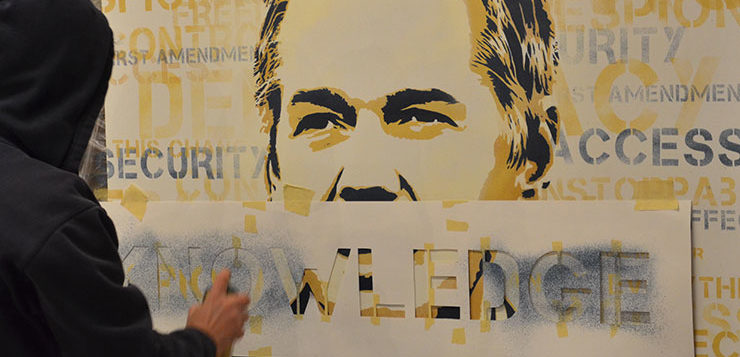State Responses to the Torture of Julian Assange, Morally Disengaging Media, and What It Means for Us All
SPOTLIGHT, ANGLO AMERICA, EUROPE, JUSTICE, MEDIA, WHISTLEBLOWING - SURVEILLANCE, 16 Sep 2019
Dr Lissa Johnson – New Matilda
Talk to the totalitarian hand: While Julian Assange rots in prison for publishing journalism, clinical psychologist Dr Lissa Johnson explains some of the science behind how we got here, and also how we push back.
6 Aug 2019 – On Sunday June 28th 2019, Western democracy arrived at an historic crossroads. Moving forward from this day, citizens of Western nations will head down one of two paths.
The first path leads towards genuine democracies, wherein governments are accountable to the publics they govern, and publics have a right to know what leaders do in their name. It is a path along which a free press fosters an informed electorate, capable of making informed decisions at election time. Such principles are not only fundamental prerequisites for democracy, but essential protections against government abuses of all kinds.
The second path heads down totalitarian terrain, currently being blazed by the Trump administration, wherein governments decide who is free to speak and who is not, including who is a ‘journalist’ and who is not, by granting themselves the power to silence those who make them look bad. This pathway not only spells death to democracy and the public’s right to know, it is a recipe for state-sanctioned abuse.
As the Science of Human Rights Coalition warns in a document titled Human Rights 101, “Unless citizens want their governments to support human rights, government leaders rarely will do so… [Human rights principles] carry no weight unless the people know them, unless the people understand them, unless the people demand that they be lived.”
People kept in the dark about their government’s activities, however, are in no position to demand anything of their governments at all, as political philosopher Hannah Arendt reminds us. Down the pathway of governmental secrecy, citizens can kiss goodbye not only to respect for human rights, but to holding their leaders accountable over any issue in which the interests of the elites and the majority clash, whether fossil fuels, climate emergency, racial and economic inequality and injustice, endless wars, mass surveillance or any other public interest matter one might care to name.
Judicial Harassment, Public Mobbing and Holding Governments to Account
But getting back to Sunday, June 28th 2019; what happened that placed Western societies at such a crossroads, faced with a choice between democracy and autocracy, freedom and tyranny, knowing and not knowing, light and dark?
On that day, the UN Special Rapporteur on torture, Nils Melzer, published letters to four ostensibly democratic states, detailing the ways in which those states have joined forces to mob, persecute, silence, harass, defame and psychologically torture a publisher of journalism.
Importantly, the states concerned have targeted the publisher in question not for causing any harm nor publishing misleading content. Quite the reverse. The publisher under attack stands out amongst his peers for his unblemished record of 100 per cent accuracy. Which makes that publisher Julian Assange.
WikiLeaks’ founder Julian Assange is being mobbed not for perpetrating harm or deception, but for making powerful leaders look bad. By publishing the truth about them.

Professor Nils Melzer, United Nations Special Rapporteur on Torture. (IMAGE: UN Photo/Eskinder Debebe)
In democracies founded on informed electorates, such journalistic activity is a welcome development. In totalitarian states, however, where powerbrokers’ interests reign supreme, it is not.
The Cambridge Dictionary defines totalitarianism as “a political system in which those in power have complete control and do not allow people freedom to oppose them”. A political system in which a publisher languishes in Belmarsh Supermax for journalism would be an example.
In fact, Pulitzer Prize winning author Chris Hedges has long argued that Western societies are undergoing a gradual transformation from democracies to corporate totalitarian states, through a slow motion corporate coup d’etat, in which power is seized not by a demagogue but by “the faceless anonymity of the corporate state.” A Princeton study in 2014 lent empirical weight to that view.
The violently oppressive reaction of powerful state-corporate interests to the publishing activities of Julian Assange appears to illustrate Hedges’ point even more powerfully still.
As punishment for keeping the world’s population so accurately informed about the inner workings of power, Nils Melzer reports that Julian Assange is not only incarcerated in Belmarsh prison, but has suffered nearly a decade of “prolonged, involuntary and arbitrary detention… [along with]sustained and unrestrained public mobbing, intimidation and defamation… [ranging from]judicial harassment… [to]open threats and instigation of violence, [including]repeated calls for his assassination or murder.”
Professor of international law Nils Melzer has succinctly pointed out that none of this has anything to do with facing ‘Swedish Justice’. Melzer explains that the Swedish investigation surrounding Julian Assange has been, from the start, “a relentless campaign of judicial persecution… [involving]abuse of the judicial system in order to try to extradite [Julian Assange] to the US”.
Most recently, that judicial persecution has entailed locking Julian Assange in Belmarsh Prison for 50 weeks over the pseudo-legal concoction of defunct bail infringement. Even the Secretary General of the Swedish Bar Association has called the Swedish investigation “deplorable”, fearing that it has “damaged the reputation of the Swedish judicial system”.
Altogether, Professor Melzer’s letters, which constitute his final report, lay the responsibility for the near decade-long campaign of persecution and psychological torture of Julian Assange squarely at the feet of the UK, the US, Sweden and Ecuador. In his letters to those four states, Melzer notified each government of their culpability via “direct perpetration or, as the case may be, through instigation, consent, or acquiescence, as well as through failure to prevent” the various forms of persecution described.
In addition to detailing the states’ culpability, Professor Melzer requested a response from each state outlining their plans to investigate the allegations in his final report, and to protect Julian Assange from further harm, as well as ensuring redress for harms caused to date. In the event that no such measures were forthcoming, Professor Melzer asked the states to “explain how this is compatible with [their]human rights obligations”.
Posted on the website of the UN Office of the High Commissioner for Human Rights, alongside Nils Melzer’s letters, are the states’ replies. Before examining those replies and their implications for Western democracies, it is worth briefly revisiting how and why the persecution of Julian Assange began.
A Tender Eye That Brought Humanity to a Vicious War
In 2007, two Reuters employees set out on assignment in Baghdad. They were Namir Noor-Eldeen, a 22-year-old photo-journalist and his driver, Saeed Chmagh, 40, a father of four.
Although only 22, Namir was regarded as among “the pre-eminent war photographers in Iraq” with “a natural sense of colour” and “a tender eye that brought humanity via quiet moments to a vicious war”.
He was “one of the most beloved members of the Reuters staff, a cheerful, funny, smart young man who loved motorcycles” a colleague recalled. A former Reuters Chief Photographer in Iraq described Namir as an “editor’s dream… [whose]quick smile and energy never faded…it’s very, very sad to know I’ll never get one of his bear-hug greetings again.”

A screencap from the infamous ‘Collateral Murder’ video, which sparked the global hunt for WikiLeaks publisher Julian Assange.
While on assignment in Baghdad, after walking calmly across an open square, the two unarmed men found themselves showered with gunfire, raining down from a US Apache helicopter above. Namir’s body was “riddled with bullet holes”, killing him instantly. His wounded colleague, Saeed, attempted to drag himself on his stomach to safety, out of the helicopter’s sights.
As Saeed crawled away, two young children, aged five and ten, arrived on the scene in a van. Their father and his friends, all unarmed, stopped to rescue Saeed from the carnage, dragging him into their vehicle. The man’s children sat and watched as their father was ripped apart by gunfire, unleashed from the helicopter above, while being strafed by bullets themselves. As they cried and bled, surrounded by death, the children had no-one to cradle them through their pain, their father lying lifeless on the ground.
“Look at those dead bastards,” one of the soldiers gloated. “Nice.”
Another US soldier described the killings as typical of “daily routine in Iraq for seven years”.
Three years later, in 2010, for posting a leaked video of the massacre, offering the world a human glimpse of the war on Iraq, as well as exposing tens of thousands of other civilian killings in Iraq and Afghanistan, Julian Assange was placed on an FBI manhunting target list.
A whole-of-government operation was launched against him, replete with a ‘war room’ under the direction of a Brigadier General, involving a “suite of government offices not far from the Pentagon”, where “120 intelligence analysts, FBI agents, and others” worked “24 hours a day, seven days a week”, targeting WikiLeaks.
httpv://www.youtube.com/watch?v=HfvFpT-iypw
In 2010 Barack Obama even urged foreign allies to file criminal charges against Julian Assange, just weeks before the legally “deplorable” Swedish investigation was instigated. As if that weren’t enough effort to silence a journalist, a grand jury was also convened, where Julian Assange now faces 17 counts under the Espionage Act and 175 years in US prison, for reporting on Namir and Saeed’s deaths, the deaths of their rescuers, and the trauma of the children who watched from a van.
For turning these carefully dehumanised foreigners into living breathing human beings, bringing humanity to a vicious war just as Namir had done, Julian Assange and Chelsea Manning have been made to pay. As punishment, both have suffered years of detention and both have suffered torture, while those responsible for the killings have walked free.
Nils Melzer warns, “When you prosecute a whistleblower and a journalist for exposing war crimes and corruption, you have to be very careful, because if you don’t prosecute the war crimes, then clearly you don’t have equality before the law… then prosecution becomes persecution.”
A Line in the Sand
The murderous acts that WikiLeaks exposed in 2010 are the very kind of acts that the US-led persecution of Julian Assange has served to bolster and protect, along with a raft of other state-corporate crime and abuse such as torture, exploitation of vulnerable populations, for instance in Haiti and the Chagos Islands, CIA domestic spying tools, predatory pro-corporate deals such as the TPP, environmental abuses by oil and mining companies, and on and on and on.
Not only has the near-decade long campaign of mobbing, judicial harassment and vilification of Julian Assange served to distract from these state-corporate abuses and crimes, creating a climate of impunity for the perpetrators, it is now poised to create a precedent of legal impunity, via the Espionage Act charges.
As numerous leading legal minds and even establishment media have warned, the Espionage Act prosecution awaiting Julian Assange in the United States stands to criminalise journalism worldwide, green-lighting cross-border pursuit of publishers around the globe. The legal upshot will be that states can get away with murder simply by slapping Espionage charges on those who expose their crimes. Or, alternatively, by torturing them to death, whichever comes first in the Assange precedent.
Either way, Nils Melzer has expressed his grave concern that “US authorities intend to make an ‘example’ of [Julian Assange], in order to punish him personally, but also to deter others who may be tempted to engage in similar activities.” Similar activities being holding power to account by publishing truthful material in the public interest, a cherished bedrock of democracy and human rights.

WikiLeaks publisher, Julian Assange, being dragged from the Ecuadorian Embassy in London in April 2019.
Chris Hedges writes that the persecution of Julian Assange represents not only a sharp downhill turn on the corporate totalitarian slide, but “the destruction of all protection of the rule of law”.
Speaking at a rally for Julian Assange in Sydney, Mike Head, of the World Socialist Website, adds that it is “not just about the past crimes [that Julian Assange]has exposed. It’s also a warning of the future crimes being prepared”.
In short, the implications of Nils Melzer’s letters to the US, the UK, Sweden and Ecuador could not be more serious nor more dire.
WikiLeaks’ editor Kristinn Hrafnsson says, “A line has been drawn in the sand and either you are going to support Julian and fight this retribution and those indictments, or you basically step back and the lights will go out. That’s how serious it is.”
The UN Rapporteur on Torture’s letters stand on that line in the sand, by demanding that the states involved publicly confirm where they intend to head from here: down the path of lights-out for rule of law and democratic freedoms, or down the path of democracy and human rights?
You Call It Torture; We Call It Upholding the US Constitution
So how did the four states respond to this historic test? How did they answer the charges that their governments, judiciaries and media have joined forces to psychologically torture a publisher for journalism? How did they square this with their stated commitment to human rights? What about democracy and rule of law?
They thumbed their noses.
Ecuador and the UK didn’t even bother to reply to the UN Rapporteur.
Human rights? What human rights? Talk to the hand.
The US and Sweden issued what appeared to be stock-standard perception-management sound-bytes, cut-and-pasted into document form.
As refutation to Nils Melzer’s concerns, both Sweden and the US opted to simply prime and exploit the same psychological vulnerabilities that have been primed and exploited throughout the long smear campaign against Julian Assange, and against victims of war crimes such as Namir and Saeed. Ultimately, their responses sought to turn reality on its head such that war crimes are virtuous, reporting war crimes is reprobate, truth is dangerous, censorship will set you free, and persecuting a publisher for journalism is “free speech”.
But what perception-management sound-bytes? What psychological vulnerabilities? Exploited how?
Paradoxically, when populations are confronted with ugly realities about their social and political worlds, such as corrupt elites rigging primaries, vainglorious celebrities who threaten and vilify minorities becoming president of the United States, civilian slaughter in illegal wars, and so-called democratic states torturing a publisher for journalism, it is the perfect time, psychologically, to glorify the status quo.
A robust program of psychological research indicates that many people are motivated to perceive the systems on which they depend as being right, good, fair and just, even in the face of powerful reasons not to, and even when suffering at the system’s hands. Psychologists call this tendency system justification.
A counterintuitive finding of system justification research is that flaws in a person’s social and political worlds typically exacerbate rather than quell system-justifying reactions. When presented with systemic failures such as corruption, injustice or abuse, many people are inclined to double down on the status quo and defend the system’s legitimacy, so as restore their sense of stability, security and wellbeing.
System-justifying reactions can include just-world beliefs, which entail victim-blaming and otherwise subconsciously distorting reality-perception to preserve the illusion that life is fair, along with all manner of other self-deceptive biases and blind spots that serve to rationalise the status quo.
Examples are double standards, moral justification, dogged patriotism and exceptionalism, or just plain mouthing empty, self-aggrandising platitudes.
All of which pervaded the replies to Professor Melzer from Sweden and the United States.
“firm commitment to freedom of expression, including for members of the media, consistent with the U.S. Constitution and the United States’ obligations under international human rights law”.
Without irony, this statement was issued in the same breath as defending the arbitrary detention and Espionage Act charges against Julian Assange for exercising his freedom of speech, in violation of international human rights law, two UN Working Group rulings, and the first amendment of the U.S. Constitution.
The letter continued,
“U.S. law protects individuals in the U.S. justice system from torture and cruel, inhuman or degrading treatment or punishment, including through protections under the Fifth, Eighth, and Fourteenth Amendments to the U.S. Constitution.”
Tell that to Chelsea Manning and the scores of innocent people detained indefinitely without trial by US authorities, while being tortured, horrifically and mercilessly, as detailed here.
The Swedish letter waxed lyrical in a similar vein.
As Voltaire said,
“Those who can make you believe absurdities can make you commit atrocities.”
In short, at this crossroads, our leaders have signalled their intention to ignore the warnings of the world’s designated authority on torture, operating under the mandate of the world’s designated authority on human rights. The states named as persecutors of Julian Assange have similarly made it clear that they intend to continue down the path of censorship-by-torture, with all the anti-democratic tyranny that that entails.
Which is to be expected, given that governments can only be relied upon to uphold human rights when their citizens demand it of them, as Human Rights 101, from the Science of Human Rights Coalition, cautions.
The question going forward from Nils Melzer’s final report, then, is not whether our governments will respond by upholding the principles of democracy, human rights and rule of law. The question is whether we, as citizens, will demand it of them.
If we fail to do this now, while we still can, it will be lights out for democracy and rule of law, as Hrafnsson, Hedges, numerous eminent speakers, leading authorities on human rights and international law, along with the leading political philosophers of our time, and history warn.
Which is why the psychology profession teaches that atrocity and collective violence, like human rights, live and die on bystanders. Just as human rights depend on active citizenship, so collective violence, such as torturing a publisher for journalism, depends on citizens standing quietly and idly by.
Accordingly, it is crucially important for perpetrators of atrocity, such as the UK, the US, Sweden and Ecuador, to ensure that publics are psychologically primed for compliant, passive bystanding to torture of publishers and war crimes.
But how is that achieved? How can populations be subdued?
Bystanding, Moral Disengagement and the Media
When states seek to get away with murder and other forms of state-sanctioned abuse, in addition to issuing empty system-justifying platitudes, perpetrators must incite what psychologists call moral disengagement.
Moral disengagement is a psychological process by which a specific event, such as torturing a publisher for journalism, is placed outside the boundaries of one’s usual morality. Most people, for instance, would find the notion of torturing a publisher for journalism wrong. Yet many are morally unperturbed as that very thing unfolds in real time.
Similarly, most people deem murder to be morally repugnant, yet are capable of placing the murder of a tender-eyed Iraqi photo-journalist outside that moral frame, letting not only the killers off the hook, but letting themselves off the moral hook to care.
But what causes people to morally disengage? How can otherwise good people, and kind people, look away?
Fortunately for state-sanctioned abusers, psychological literatures offer well-researched insights on how to incite people to morally disengage. Those literatures, of course, are intended as preventative offerings, by way of self-awareness and insight. They can, however, equally serve as instruction manuals.
According to psychological research, moral disengagement is stoked by dehumanising and demonising targets among other things. Which is where the establishment media comes in.
Along with perpetrators and bystanders, psychological understandings of atrocity and collective violence point to instigators as playing a critical role. Instigators are those who control the flow of information. In other words, those who control the media.
Controlling the flow of information gives instigators the power not only to cover perpetrators’ tracks, but to dehumanise and blame the victims, thereby bringing bystanders passively into line. Controlling the flow of information in corporate-states, moreover, such as the US and the UK, means exerting state-corporate control of media. Which is precisely what has been taking place for decades.
Under the guise of a “free press” throughout the Western world, legacy media is now not only owned by a small handful of corporate interests, it relies on corporate advertising dollars, including from arms manufacturers, along with government money, and a military-intelligence-corporate-PR machine that funnels press releases through just three gatekeepers, to journalists who are too overworked and underpaid to investigate what they are fed.
In other words, a military-industrial-media empire feeds newsrooms their narratives, such that most news is “managed by governments, corporations, and PRP (public relations and propaganda) firms” writes Professor of Sociology and former director of Project Censored, Peter Phillips. Cut and paste-journalism, in which reporters recycle one another’s material, takes care of the rest.
There are, of course, exceptions. However, according to scholarly analyses, upwards of 80 per cent of mainstream news now fits this model.
In such an environment, persecuting states, such as those named by the UN Rapporteur on Torture, are perfectly poised to incite what psychologists call an atrocity generating situation. All that is required is to feed newsrooms narratives that normalise, sanitise, trivialise and rationalise atrocity, while dehumanising victims, thereby inciting publics to morally disengage. In this equation, what is omitted is just as important as what is woven in.
The Australian Broadcasting Corporation (ABC) Four Corners program, for instance, recently showcased a range of such tactics in its two-part ‘investigation’ of Julian Assange. From overt and covert dehumanisation and demonising, to narratives woven from omitted facts, along with baseless and discredited claims asserted as gospel, it was a case study in inciting moral disengagement from collective violence. The program deployed all the psychological tricks in the book to recycle the very vilifying, manufactured media narratives that Nils Melzer has denounced as abusive, while posing as a balanced report.
But how did the program reconcile this with Professor Melzer’s damning findings, which had been available in summary form for 60 days at the time of broadcast? How did it fend off the obvious charge that the program embodied the very “fabrication and manipulation” Melzer described, in which “many media outlets and individual journalists have shown a remarkable lack of critical independence and have contributed significantly to spreading abusive and deliberately distorted narratives about Mr Assange”?
Simple. It didn’t. It didn’t even try.
Instead, the Four Corners program buried Nils Melzer’s report. Over an hour and a half of discussion of Julian Assange, not one mention was made of the fact that the world’s designated authority on torture has found the states at the centre of the Four Corners program responsible for mobbing, judicially harassing, defaming and psychologically torturing Julian Assange.
Not only is this complicit in the torture that Nils Melzer describes, both by inciting passive bystanding and perpetrating the psychologically abusive smears, it is complicit in the suppression of dissent, by suppressing the UN Rapporteur’s report. Suppressing dissent and political opposition, moreover, is the whole totalitarian point of persecuting Julian Assange.
If nothing else, the Four Corners program illustrates the establishment media’s contentment to follow their leaders down the anti-democratic path of censorship-by-torture, while taking us all along for the ride.
At this democratic crossroads, although establishment media have signalled their reluctance to support Espionage Act charges, in the knowledge they could be next, many nevertheless appear willing to act as instigators of torture, inciting publics to morally disengage, so that states can continue persecuting Julian Asssange.
Every act of ‘journalism’ that buries crucial information, and every utterance that vilifies or dehumanises Julian Assange, or sanitises his abuse, is complicit.
Nils Melzer warns,
“As you watch [Julian Assange] pay for the audacity of exposing corruption and crime, please ponder what this means for you, your country, and your family. Ponder deep and ponder hard, and then use your democratic rights to hold your Government to account. For once telling the truth has become a crime, while the powerful enjoy impunity, then your own rights may well be next in line.”
_____________________________________________________
 Dr Lissa Johnson is a clinical psychologist in private practice. Prior to becoming a psychologist she qualified in Media Studies, with a major in Sociology. She has a longstanding interest in the psychology of social issues and the impact of social issues on psychology, and is a former member of the Australian Psychological Society Public Interest Advisory Group.
Dr Lissa Johnson is a clinical psychologist in private practice. Prior to becoming a psychologist she qualified in Media Studies, with a major in Sociology. She has a longstanding interest in the psychology of social issues and the impact of social issues on psychology, and is a former member of the Australian Psychological Society Public Interest Advisory Group.
Go to Original – newmatilda.com
Tags: Activism, Big Brother, Conflict, Democracy, Ecuador, Human Rights, Journalism, Justice, Media, Military, NATO, Nonviolence, Power, Social justice, Solutions, Spying, Surveillance, Sweden, Torture, Trump, UK, UN, USA, Violence, War, West, Whistleblowing, WikiLeaks, World
DISCLAIMER: The statements, views and opinions expressed in pieces republished here are solely those of the authors and do not necessarily represent those of TMS. In accordance with title 17 U.S.C. section 107, this material is distributed without profit to those who have expressed a prior interest in receiving the included information for research and educational purposes. TMS has no affiliation whatsoever with the originator of this article nor is TMS endorsed or sponsored by the originator. “GO TO ORIGINAL” links are provided as a convenience to our readers and allow for verification of authenticity. However, as originating pages are often updated by their originating host sites, the versions posted may not match the versions our readers view when clicking the “GO TO ORIGINAL” links. This site contains copyrighted material the use of which has not always been specifically authorized by the copyright owner. We are making such material available in our efforts to advance understanding of environmental, political, human rights, economic, democracy, scientific, and social justice issues, etc. We believe this constitutes a ‘fair use’ of any such copyrighted material as provided for in section 107 of the US Copyright Law. In accordance with Title 17 U.S.C. Section 107, the material on this site is distributed without profit to those who have expressed a prior interest in receiving the included information for research and educational purposes. For more information go to: http://www.law.cornell.edu/uscode/17/107.shtml. If you wish to use copyrighted material from this site for purposes of your own that go beyond ‘fair use’, you must obtain permission from the copyright owner.
Read more
Click here to go to the current weekly digest or pick another article:
SPOTLIGHT:
- How Trump Can Turn Back the Doomsday Clock
- Brazil-USA: A Tale of Two Caudillos
- Albert Einstein on Jews in Palestine
ANGLO AMERICA:
EUROPE:
JUSTICE:
- Statement of the ICC Office of the Prosecutor on the Arrest of Former Philippine President Rodrigo Roa Duterte
- Ireland Formally Joins ICJ Genocide Case against Israel
- Good and Bad War Criminals
MEDIA:
- The Media Navigator (2025)
- Zuckerberg and Musk Have Shown that Big Tech Doesn’t Care about Facts
- BBC Middle East Editor Collaborated with CIA, Mossad
WHISTLEBLOWING - SURVEILLANCE:

